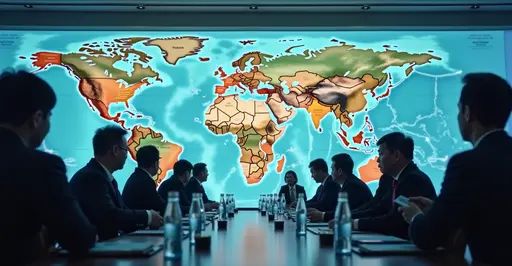
Asia-Pacific Leaders Forge New Economic Partnerships
In a landmark gathering of the Asia-Pacific Economic Cooperation (APEC) summit hosted by South Korea, member economies have reached significant agreements on trade facilitation and digital cooperation that promise to reshape regional economic integration. The 2025 summit, held under the theme "Building a Sustainable Tomorrow," brought together leaders from 21 Pacific Rim economies representing nearly 40% of the world's population and over 60% of global GDP.
Trade Facilitation Breakthroughs
APEC members committed to accelerating the implementation of the WTO's Trade Facilitation Agreement, with a focus on digitalizing cross-border trade procedures and documentation exchanges. The agreements include measures to reduce customs clearance times by 30% and streamline border procedures through enhanced digital infrastructure. Member economies agreed to establish a regional framework for paperless trade, including cross-border recognition of electronic bills of lading and invoices.
The summit outcomes build on previous commitments made in the 2023 San Francisco Principles and the 2024 Lima Declaration. Leaders endorsed the "Seoul Action Plan" which includes specific targets for reducing trade costs and improving supply chain resilience across the Asia-Pacific region.
Digital Economy Cooperation
In the digital realm, APEC economies agreed to advance the implementation of the APEC Internet and Digital Economy Roadmap (AIDER), prioritizing actions that support innovative and sustainable economic growth. The digital cooperation package includes:
- Establishment of a regional framework for data flow governance
- Enhanced cooperation on artificial intelligence standards and ethics
- Initiatives to bridge the digital divide, particularly for rural and underserved communities
- Promotion of digital skills development programs across member economies
The agreements also include provisions for strengthening consumer protection in digital transactions and promoting interoperability between different digital systems across the region.
Sustainable Development Commitments
Building on Korea's host year priorities, APEC leaders emphasized the integration of sustainability into trade and investment policies. The summit produced the "Incheon Declaration on Sustainable Trade," which includes commitments to:
- Promote trade in environmental goods and services
- Advance circular economy approaches in regional supply chains
- Support just energy transitions across member economies
- Enhance food security through sustainable agricultural practices
Economic Inclusion Initiatives
The summit placed significant emphasis on inclusive growth, with particular focus on supporting micro, small, and medium enterprises (MSMEs), women entrepreneurs, and underrepresented groups. Key outcomes include:
- Launch of the "APEC MSME Digitalization Fund" to help small businesses adopt digital technologies
- Enhanced support for women-owned businesses through the "Women in E-Commerce Initiative"
- Commitments to improve access to finance for underrepresented entrepreneurs
- Initiatives to promote skills development and workforce readiness for the digital economy
Regional Economic Integration
APEC leaders reaffirmed their commitment to the long-term goal of establishing a Free Trade Area of the Asia-Pacific (FTAAP). The summit produced the "Busan Framework" for advancing regional economic integration, which includes:
- Enhanced information sharing on regional trade agreements
- Capacity building programs for developing economies
- Mechanisms for addressing non-tariff barriers to trade
- Initiatives to promote regulatory coherence across member economies
The outcomes of the 2025 APEC summit represent a significant step forward in regional economic cooperation, particularly in the areas of digital transformation and sustainable trade. The agreements are expected to facilitate greater economic integration across the Asia-Pacific region while addressing contemporary challenges such as climate change, digital disruption, and economic inequality.
As the world continues to navigate post-pandemic economic recovery and geopolitical uncertainties, the APEC agreements provide a framework for cooperative action that balances economic growth with social and environmental considerations. The implementation of these commitments will be closely watched by businesses, civil society organizations, and other stakeholders across the region.

 Nederlands
Nederlands
 English
English
 Français
Français
 Deutsch
Deutsch
 Español
Español
 Português
Português





